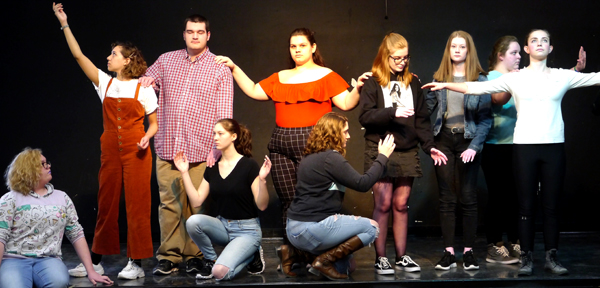PECI students ask public to respond to A Call to Action
Administrator | Mar 24, 2019 | Comments 1
 Story and photo by Sharon Harrison
Story and photo by Sharon Harrison
Students in the drama room at Prince Edward Collegiate Institute (PECI) are bringing the issues of truth and reconciliation to the public this week.
A Call to Action: A Collective Creation about Truth and Reconciliation sees department head Matthew Sheahan and his students tackle the topic in a sequence of vignettes interspersed with music.
Topics address the question of what truth and reconciliation is in the eyes of the students. It also includes a series of enigmatic statements, beginning Dear Canada, Dear World, Dear Intolerance and Dear Discrimination. Pipelines are mentioned, clean water too, and there is a message of understanding and empathy to residential school survivors.
The students included a ‘Dear Justin Trudeau’ category that begins by asking the Prime Minister:
“Why are some people treated better than others? Why are laws only enforced for some of us? Why are you following the Charter of Rights and Freedoms while enforcing the laws for Indigenous people, and lastly, we do you procrastinate?”
“There is no story all the way from beginning to end,” says Sheahan. “We are exploring multiple and different aspects of truth and reconciliation.”
The class began working on the play at the end of September. It will be performed for the County’s elementary students and in three public performances.
“Mr. Sheahan came up with the general concept, but it went differently to what he was expecting,” said Grade 10 student, Kennedy Babutac.
“The play was written by everyone here,” said Sheahan during a rehearsal last week. “I provided them with news clippings in relation and they took the material from there and I then helped cultivate with them,” he said.
“The audience gets a chance to talk to the kids afterwards to engage in conversation, which is important. That’s the point,” said Sheahan. “It’s about building those bridges.”
Some words in the vignettes speak to a residential school survivor: “I don’t really know much about what happened behind the closed door of your residential school. I want to know everything because while most history is bad history, it makes us who we are today. What did you have to go through and why is it something so terrible, but something me and my classmates will never have to experience. I bet you want to know too, but I wonder, do you wish for revenge or do you want nobody to ever feel that way again. I want to know.”
“Coming into this I knew some of what happened with residential schools and all the happenings with the women and how they went missing and how they were the higher murder type, but I have learned a lot more than I would have just sitting in a classroom,” said Amber Peeling, a Grade 11 student. “So we get to bring to life what we don’t usually get to learn as much about.”
Another vignette asks: Dear Canada: Don’t you realize it’s not just the past. No, we don’t currently have residential schools, but the legacy is still there. Is the legacy a good one? These people are still facing injustice. What we see as a problem is normal for some. We complain that our Internet isn’t working or our favourite show isn’t on, but there are people in our own country who do not even have access to water and yet we do nothing about it. So what now, how do we change this? Do we help them or do we just keep on believing that this isn’t an issue. How can we as a country help better the situation? Sincerely, the people.”
Grade 12 student, Amanda Johnson had a base knowledge of the topics covered in the play. “More important I think was the lesson in learning about Muslims and different people’s point of view on them,” she said. “Through the exercise, we have learned everybody has a different opinion or a different way to see things and I think that was the most interesting part.”
A vignette states “Dear intolerance: You are so hard for me to understand how you can fill people’s minds and turn them against each other. All throughout history and still to this day you have killed people and put them through terrible things. Perhaps if we could understand you, we could stop you, but we can’t. All we can do is remember the results of living in the past and by eliminating people’s lives, the past will not be repeated. As more of our people open their eyes to the terrible reality of the world today, we realize we can and we must do better. Sincerely, humanity.”
It’s a relatively short production at 40 minutes, yet the students cover relevant issues with informed accounts, and are not afraid to ask difficult questions surrounding sensitive and difficult topics, resulting in a peaceful and heartfelt production.
The Truth and Reconciliation Commission put forth 94 calls to action in 2015. Since then dozens of reserves in Canada still remain under boil water advisories. A 2015 United Nations report found that Indigenous women were five times more likely to die under violent circumstances as compared to non-Indigenous counterparts. While Indigenous people make up five per cent of the Canadian population, they made up 27 per cent of the federal prison population in 2016-2017.
“I did know a bit about what happened before about residential schools and everything, but coming into this collective creation, it has really taught me more than I have learned,” said Kennedy Babutac, a Grade 10 student. “I think we all need to listen to what we have to say.”
Another vignette message: “Today, our entire culture and existence is based upon the suffering of others. Today, we pride ourselves in who has more, who can take more. Today, we still can’t fully understand what happened and we can’t change it, but we can raise questions without answers, rather than answers that can’t be questioned.”
The performers conclude reconciliation is not an easy path, but one that requires hard work, questions, compromises and action. “We ask you to answer this call to action.”
A Call to Action: A Collective Creation about Truth and Reconciliation will include public performances in the drama room at PECI on Barker Street in Picton on Wednesday, March 27 and Friday, March 29 at 7pm. Tickets are $5 at the door. Email msheahan@hpedsb.on.ca to reserve as seating is limited.
The group will also perform March 28 at the CORE Arts and Culture Centre in Belleville, at 7 p.m. There will also be performances for the County’s elementary students.
Filed Under: Arts & Culture • Featured Articles • Hastings & Prince Edward District School Board • News from Everywhere Else • PECI - It's a Panther Thing
About the Author:



































If the future is in the hands of teachers like this guy.
The world is gonna be ok.